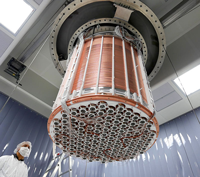Physics
Purdue University in West Lafayette
A bachelor of science degree includes both a broad understanding of physics concepts and a chosen area of specialization. The core courses provide a solid foundation in classical mechanics, electricity and magnetism, waves and oscillations, quantum mechanics, thermal and statistical physics, modern physics, relativity, electronics, and computational physics.
Using electives courses offered in the department, students can choose concentrations in condensed matter physics, nuclear physics, astrophysics and particle physics.
Students are encouraged to participate in one or two semesters of individual research projects with a selected faculty member.
While most students pursue advanced degrees, graduates have the knowledge and technical skill to succeed in careers within physics, engineering, medicine, finance, and the government.
Faculty Spotlight: Rafael Lang

Puzzling 'excess events' may be pointing to dark matter, scientists say
Most of the universe is thought to be made up of dark matter, a mysterious material whose existence has been only implied and never actually detected.
This week, however, in a paper co-authored by 163 scientists from 11 countries, researchers describe what for now they are calling "excess events," which occurred in the background of the experiment.
"This is really a rather surprising result," said Rafael Lang, Purdue University associate professor of physics and astronomy. "The excess measurements do not show up in our main analysis, but rather in our background events. It's really curious in many ways. Unexpected for sure. Unclear as to what causes this. It's certainly some new effect that we hadn't considered before."
The results are published as a pre-print on ArXiv.org and are being submitted for publication in a peer-reviewed journal.
The experiment was conducted at the Laboratori Nazionali del Gran Sasso, an underground particle physics facility in the Abruzzo Mountains of Italy, about 75 miles north of Rome. The research was conducted using the XENON Experiment's XENON1T Data Acquisition System.
"Really XENON1T is an experiment to search for dark matter. But in the process, we realized that there are much more physics we could observe with that machine," Lang said. "I had systematically scoped out the various physics analyses we could do with this detector, and in doing so, we stumbled across this excess. It's just due diligence. Or serendipity. Your pick.
"The question is: Is this some known physics, such as a tiny contamination with tritium, or is this the tip of the iceberg pointing to truly new physics, beyond what we know from textbooks? We simply don't know at this point."
The scientists are not saying that they have found dark matter, but that is one of several possibilities. The unexpected signals are similar to what might be seen from a radioactive isotope of hydrogen, tritium, as a type of artifact of the experiment. It could be the indication of previously unknown properties of neutrinos, the scientists said.
But what is causing excitement among the scientists is the possibility that this is an indication of a new type of particle. Perhaps the hypothetical solar axion...
Plan of Study
Physics WebpageTransfer to Physics
Purdue admits to individual majors. Transfer students must meet Purdue's overall transfer criteria, as well as any major-specific requirements. Before you apply, check the closed programs page to confirm this major is open to transfer students. If it is, refer to the information below for major-specific transfer criteria.
Minimum GPA: 2.5
Additional Requirements: Completion of at least one semester of college-level calculus equivalent to MA 16100 or MA 16500 with a grade of C or higher.
Contact Information
Director of Recruiting, College of Science
(765) 494-1990
sciencerecruiting@purdue.edu
Careers in Physics
A bachelor’s degree in physics prepares students to pursue careers in an extraordinary variety of areas, including technical and managerial careers in industry and basic research in universities, industrial laboratories, and national laboratories.
The general problem-solving skills developed in physics studies serve students well not only in careers in physics but also in careers in other sciences, engineering, law, medicine, management, finance, and government.
Some examples of careers chosen by physics majors include teacher, doctor, research scientist, lawyer, physician, architect, technical salesperson, electrical engineer, aeronautical engineer, astronaut, geophysicist, software designer, technical analyst, reliability engineer, and process engineer.
